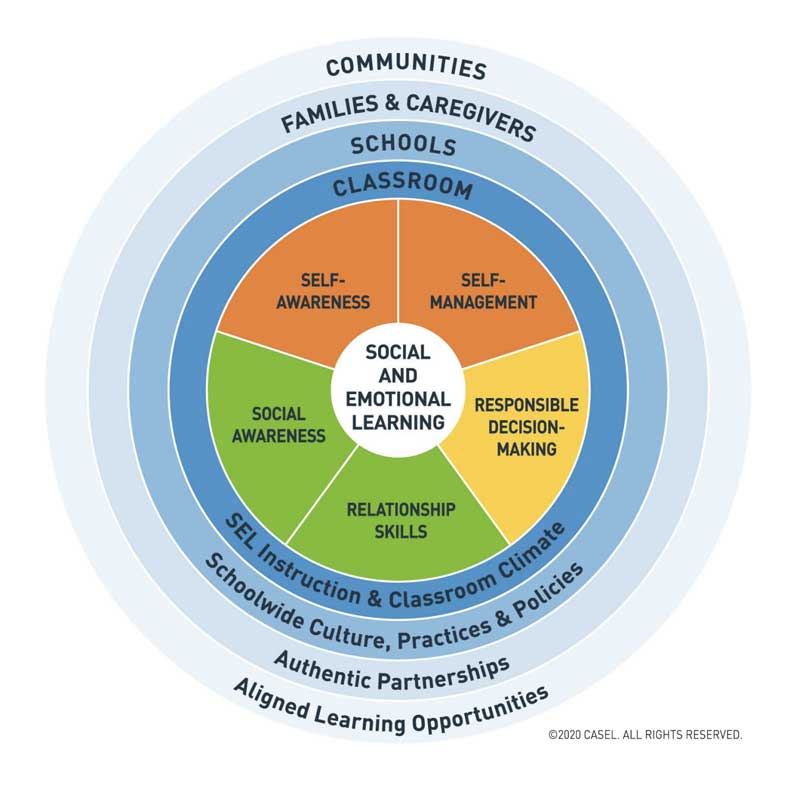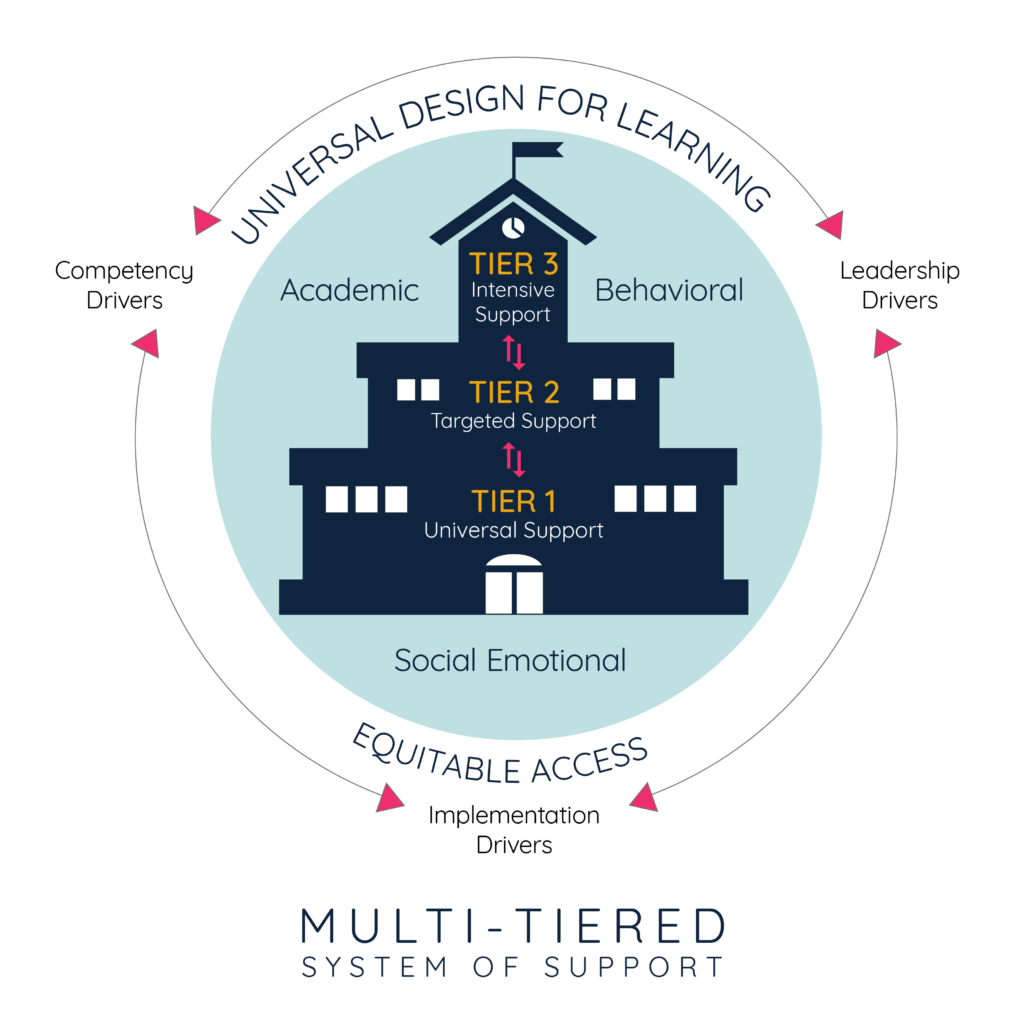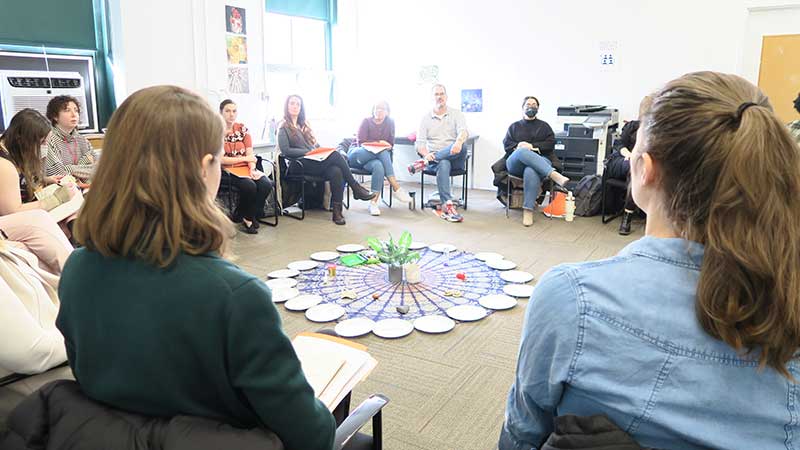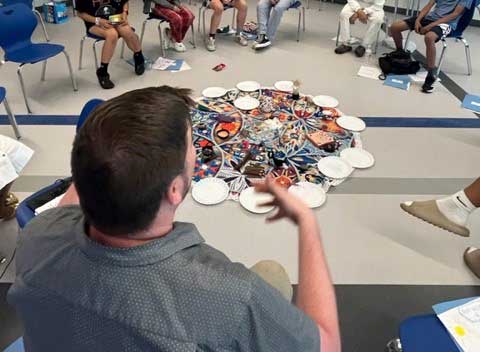Social Emotional Development
Somerville School Committee Goal
To provide all students with integrated classroom lessons from a high quality social-emotional learning curriculum that helps students value and develop their ability to build relationships with other students, to be self aware and socially aware, to self regulate, and to make responsible decisions…read more.
Framework for Systematic Social and Emotional Learning
Somerville Public Schools supports every student’s social and emotional development through curriculum and practices called SEL (Social Emotional Learning). SEL is the process through which all young people and adults acquire and apply the knowledge, skills, and attitudes to develop healthy identities, manage emotions and achieve personal and collective goals, feel and show empathy for others, establish and maintain supportive relationships, and make responsible and caring decisions. https://casel.org/fundamentals-of-sel/

Overview of SEL and Mental Health Supports
We think of our SEL support systems, education, and interventions as three groupings, called “Tiers.” For most of our students, Tier 1 will be all they need. Students can progress through the Tiers to receive deeper and more customized support from staff. As students move up the continuum, they move into mental health, receiving care from clinicians and embedded social workers.

All Students: Tier 1
Tier 1 provides the SEL, mental health, and behavioral foundational competencies. Data from screening is used to differentiate instruction within Tier 1. All students will have equitable access to explicit instruction and practices that address grade-level expectations for social emotional learning.
Examples of supports at this level:
- School-wide Positive Behavior Intervention System
- Positive parent / family engagement
- Restorative Justice - Tier 1 Circles
- Responsive Classroom (some schools)
-
Second Step Social Emotional Learning Curriculum
- Second Step programs are research-based programs for Early Learning through Grade 8 students. The programs are designed to promote school success, school connectedness, and a safe, respectful school climate, while also addressing problem behaviors. The programs do this by teaching self-regulation and social-emotional skills and by addressing bullying and unsafe behaviors. Second Step programs are developmental and sequential, building on skills and gradually becoming more complex as students get older. The programs provide clear school-wide norms for prosocial behavior (behavior intended to help others).
- 19 classrooms implementing 2nd Step Curriculum as Early Adopter
- K-5th grade: 20 lessons
- 6-8th grade 26 lessons
- School Counseling - classroom and brief individual support
- Daily attendance calls and intermittent behavioral support
- Engaging and culturally responsive curriculum and instruction in all subject areas
- Classroom management with clearly established and reinforced expectations and norms created with student voice
Some students: Tier 2
Tier 2 supports are identified through referral and initiated via Student Support Teams meeting within each school. Tier 2 is preventive intervention offered to students for whom Tier 1 SEL and behavior interventions show continued challenges. Tier 2 interventions target the underlying, lagging skills that impact the students' progress. Students in tier 2 receive supplemental small group instruction and one-to-one counseling. Importantly, this instruction should be systematic, explicit, and highly interactive. Progress monitoring data should be used to group students periodically. Students who demonstrate improvement and exit from Tier 2 support should be carefully monitored to ensure that general classroom SEL instruction is adequate.
Examples of supports at this level:
- Safety plans
- Mediation of peer conflict
- Restorative Justice - Tier 2
- School social worker groups
- BCBA Classroom/Teacher Consultations
- Behavior plans written by dean / counselor
- Embedded counseling with a community partner
- SOA home visits, attendance meetings, and contracts
- Referral to Department of Children and Families (DCF)
- Becoming a Man (BAM) & Working on Womanhood (WOW)
- Ongoing support for behavior and / or attendance by deans
- Short-term individual / group counseling / emotional support
- SST Meeting Referral for problem solving and action planning
Very Few students: Tier 3
Tier 3 is intensive intervention offered to students for whom support in Tiers 1 and 2 was insufficient. Instruction in Tier 3 targets the underlying SEL lagging skills and mental health concerns. Ongoing evaluation of student competencies is critical in Tier 3. If students still experience difficulty after receiving high-quality SEL / MH behavioral and targeted Tier 2 support, they may be evaluated for possible mental health issues and / or special education services, but Tier 3 is not synonymous with special education. Initiated via SST meeting, case conference, IEP / 504 team meeting, and / or delivered as part of a specialized program.
Examples of supports at this level:
- Functional Behavior Assessment and Behavior Intervention Plan by Board Certified Behavior Analyst
- Child Requiring Assistance court filing by a Supervisor of Attendance
- School Adjustment Counselor Services
- Behavior Support Team
- Evaluation and Support
- General Education Behaviorist for families, teachers, counselors
- Substance Abuse Specialist individual support
- School Social Worker individual/ wraparound support
- Restorative Justice - Tier 3 (harm circles)
Training our Staff in SEL
SEL / MH Professional Development Opportunities
Our staff are trained in:
- Second Step
- Nonviolent crisis intervention - verbal and safety de-escalation training
- Positive Behavioral Interventions and Supports
- Student Services Department Professional Development (deans, counselors, adjustment counselors, social workers)
- Coaching by building-based Social Emotional Learning Specialists
- District Professional Development catalog
- Restorative Justice
Training our Staff in Restorative Justice

Restorative Justice
SPS is currently in the second year of a three-year Social Emotional Learning Development Plan. By the end of year three, all educators and support staff will have gone through Tier 1 training and many will learn Tier 2 and Tier 3 techniques.
Educators have begun implementing restorative justice practices, including restorative circles, in their classrooms. In this model, every community member has an equal voice, including students. These practices build relationships and trust among members of the classroom community, strengthening the classroom community.
Learn more about this approach at the Center for Restorative Justice at Suffolk University website.
Educator and Staff Training
Introduction to Restorative Justice Practices and "Circle" (Tier 1 Training). This two-day experiential training prepares teachers and staff to design and facilitate restorative circles. Participants will directly experience circles; understand the elements, philosophy, and rituals of the circles; and practice both planning and facilitation of circles.
Restorative Mindset and Classroom Management (Tier 2 Training). This advanced two-day training focuses on how to use restorative justice practices to build a restorative workplace and school setting and to respond when issues and disruptions arise. A range of Tier 2 practices will be covered, including restorative conversations with one or more participants, and circles responding to culture issues as well as incidents of harm that have affected colleagues and students.
Addressing Conflict Using Restorative Justice Practices (Tier 3 Training). This advanced two-day training focuses on how to respond when the inevitable occurs and things get off track. Staff will be introduced to different approaches to address harm and transform conflict and explore how to respond restoratively to an incident between two or more colleagues or students. We will learn more about how to use the restorative questions when there is conflict and how staff can intervene in a way that is fair to everyone and allows the colleagues and students to be able to fully move past the incident.

